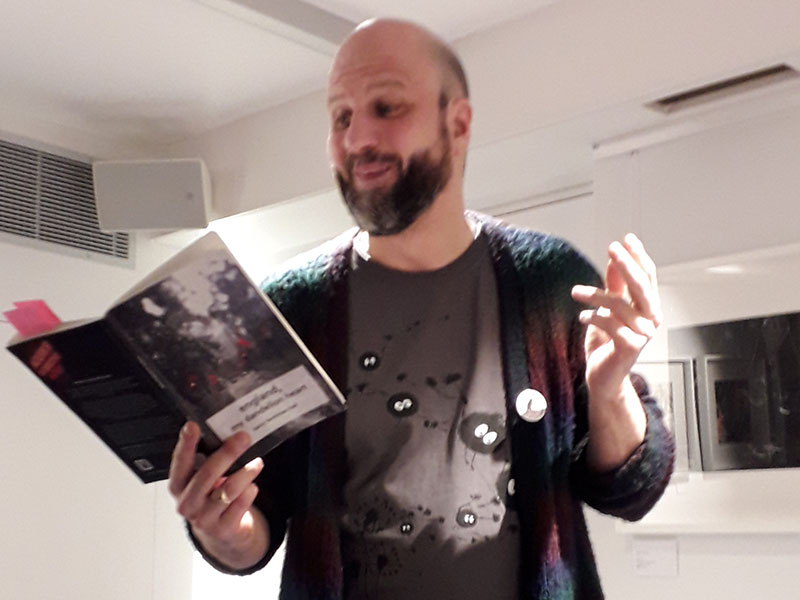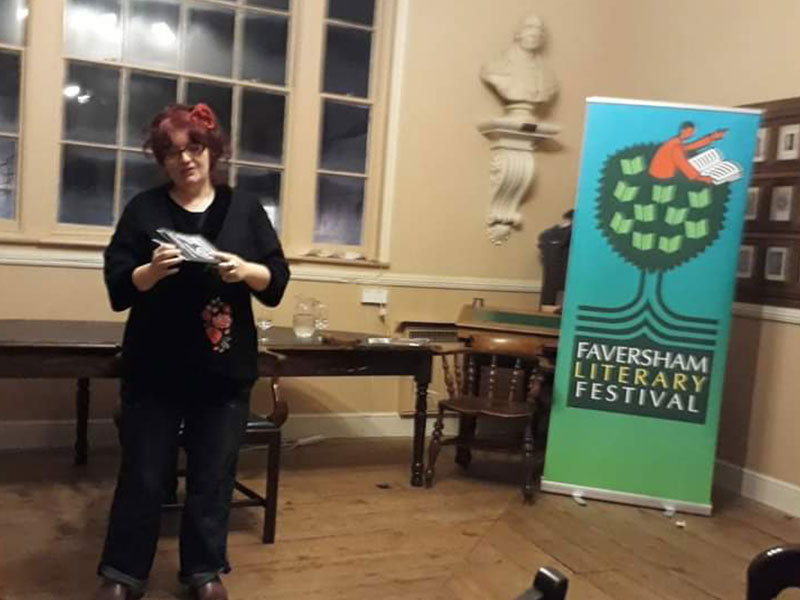Interview with Sam and Barry Fentiman
This week we are chatting with the founders and pioneers of creative writing events in and around Kent area the founders of Wordsmithery and Confluence Magazine Sam and Barry Fentiman.
Sam is on Twitter – @Wrdsmithery
Barry is on Instagram – Barry Fentiman Hall
Tell us a fun fact about yourself and how you got into poetry?
On my way to work one day I realized I needed money to get there and still hadn’t picked up my bank card from the branch so I detoured. When I got there I further realized I had no ID with me. It was then that one of the staff said “don’t worry I know who he is, he’s that poetry guy” and I was given my card and went on my way. A friend later said I should get that put on a T shirt…
I started writing poetry when I was about 18 I think. I have always had odd tangential stories bouncing around in my head but I didn’t have a great time at school and it took till I was out of it by a couple of years for me to be able to form them into coherent ideas. I kept writing till my mid 20s and just put such things away and tried to be an adult. I had been living in a small town in Yorkshire in the 80s and there were simply no outlets that I was aware of, so I just stopped. After a couple of false restarts on the way I met Sam and moved to Kent. Suddenly there was this world where were art was possible and there was a chance to write properly, and I’ve been doing it ever since.
Can you tell us about Wordsmithery and how you came about starting it up?
When Sam moved to Medway about 10 years ago – there didn’t seem to be any sort of live literary scene, so she set up a writers’ group, which started doing more events and so morphed into Wordsmithery. Wordsmithery is an independent literary arts organisation and publisher. We run literary events, like the event for International Poetry Day, and a regular spoken word night in Medway called Roundabout Nights. We also run one-off projects such as ‘The Word Shed’ for Fuse Festival in 2012 – a portable writing retreat in a shed! We have published various poetry collections and publish Confluence magazine.
You also have a magazine called Confluence, can you tell us about the magazine and why is started?
As we knew so many local writers, we had always thought there was a space for a print magazine showcasing Medway and Kent writers. After a couple of years thinking about it, we decided to go for it. We set up Confluence initially as an A4 fanzine style limited edition magazine, but we were awarded some Arts Council Funding last year to develop the magazine and run some writing projects as part of that – so we redesigned the magazine and made it more of a pocket-sized thing that people can read on the train. We don’t just include Kent writers in the magazine, as we wanted to introduce Kent writers to writers in other parts of the UK and internationally, and we don’t just accept pieces about rivers – even though we are named after the merging of rivers! Find out more about Confluence at our website – www.confluencemagazine.co.uk
Over the last few years what has been the one thing that stands out the most in the Kent poetry community?
I would say the broadening of opportunity. Since I moved here regular open mic nights in Medway have gone from zero to three. Faversham now has regular things revolving around the literature festival, Thanet has so much going on that you could throw a handful of peanuts in the air in a Margate pub and probably hit a writer of some sort with one of them before it lands. And on the publishing front Confluence has established itself very much as the sort of outlet I would have loved to find as a youth. There’s the Thanet Poetry Journal too. And there’s lots going on print wise in Canterbury. I have seen people very much starting out a few years ago who are now of a professional standard owing to the places they can be heard and published, and the scene that has grown up that can support them.
What would be your top five tips for a budding poet and why?
- Read. Read everything. Read old classic poetry, read new stuff, read what your peers are doing. Read novels. In doing so you will find on whose shoulders that you stand and whose elbows you are bumping with. It allows you to see what is possible and what twist you can put on what has gone before.
- Write all the time. I firmly believe the brain is a muscle in that respect. The more you use it the more powerful it becomes. There will be times when you have been writing a while when you need to go fallow for a while and step away from the page but to begin with a way to put a line down should never leave your side.
- Find your voice. Never try to copy anyone else because they are better at being them than you will ever be. On the flipside there is only one you and nobody else can be that. Let it come out naturally and your writing will flow better as a result. It can take a while to do this but it is worth the wait. And never be tempted to borrow. People really will find out.
- Work out what sort of poet you want to be. Is performing really your thing? Or do you want to go more for the page? Some people just write for the mic and some don’t. It is of course perfectly OK to do both but bear in mind that they really do require different disciplines. I’ve never heard someone recite a sonnet at a competitive poetry slam although I’d be interested to see how it goes. In the end it comes down to what gives you the most satisfaction.
- Support other writers. If you take up poetry as a lifelong thing and you want to get books out, win prizes, or win slams then of course you have embarked upon a competitive business and there’s no getting away from that. But we are not in an arms race. It should not be necessary for your contemporaries to fail to make your successes sweeter. If you like their book, buy it. If they’ve done well, tell them. If you can impart any advice at all, do it, but in a human way. That is all.
If someone has never performed at an open mic what would be your advice?
First of all, decide if you want to recite from memory or read from the page. Either way you will need to practice your poems but going from memory will just make the process longer. If you are reading then your words will take care of you and there is no fear of drying up on stage. I would probably say to try reading first but it depends how good a memory you have, mine is awful so I almost always read. But you must practice, first to yourself, then to trusted friends as you grow in confidence. This will tell you many things about what you have written. You will know how long your poems are for a start. This will help you not get the face of rebuke from the host for overrunning. So always make sure you have timed your set. And the more you practice the more you will really be able to get inside the poems. You will know what parts to stress, how fast to go (slower is nearly always better but you’ll work it out), and you will know if anything jars and needs to be changed. If you are writing in a classic form you will know too if the rhymes and meters are off. But ultimately, once all this is done, you will need to get on the horse. Choose an event where preferably you know the people running it and at least some of the crowd. But even if you cannot do this, remember that by and large people are on your side and they want you to do well. Nobody goes to a poetry night to heckle generally and on the rare occasion this happens good hosts stamp on it pretty quickly. So you will be just fine, honestly you will…
For someone who has not performed at an open mic event, roughly how long is an average poem and how many would they need for a 5 minute performance?
I find that the majority of my poems come in at around a minute, a little over, or a little below, so maybe 4 for me with minimal chat. But we are all different. I have a friend who tends to write very short stuff and she can get through 6 in 5 minutes easily. For your first go I would do 3, and make sure you know how long your introductions will be. For a 5 minute slot, best keep them short and to the point. But it really depends how long your work is turning out to be when you have timed it in your rehearsal sessions.
How do people find out about open mic events in and around the Kent area?
There are lots of groups on Facebook – you could join/like the Kent Poetry Collective group, Wordsmithery group, Roundabout Nights page and Confluence page.
Is there a poem you wish you had written? If so what poem would it be and why?
In every collection that I enjoy there’s always at least one that falls into that category! The one I keep coming back to is “The Catch” by Simon Armitage. It is a short poem that perfectly encapsulates that moment in a game of cricket when the ball flies of the bat in your direction. This is your big chance to get your name on the scorecard. He slows time down with this poem so well. I asked him in a webchat thing on The Guardian if he really took that catch and he says that he did!
Where can people find you on social media and what are your social media handles
Twitter/Instagram/Facebook?
Sam is on Twitter – @Wrdsmithery
We have already mentioned the Wordsmithery Facebook group – it’s a place where as well as news from Wordsmithery, we post info about competitions and events. The Wordsmithery website www.wordsmithery.info gives info on all our projects.
Barry is on Instagram – Barry Fentiman Hall



